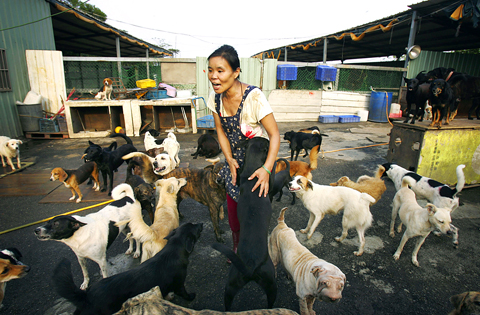It’s not just people worrying about losing their homes amid the global economic downturn. Now, even canines face being dumped from their dog houses.
Coinciding with the local stock market plunge and a jump in the unemployment rate, animal rescuers say more and more dogs are being abandoned as owners look for ways to cut expenses.
Taking note of the problem, authorities in Taipei are trying to keep better track of dogs and their owners in a bid to prevent abandonment.

PHOTO: WALLY SANTANA, AP
Tiger Tung (董冠富), chief executive of the Taiwan Life Caring and Animal Rescue Organization, said his group has seen a marked increase in the number of dogs it has treated since the downturn began, especially larger breeds.
He said in the last three months his organization saved about 30 large-sized strays, including Old English sheepdogs and golden retrievers, compared with 10 in the three previous months.
“Big dogs tend to be thrown away during a slowing economy,” Tung said, adding that owners can save between NT$5,000 and NT$10,000 a month by abandoning them.
Taiwan has been hit hard by the global financial crisis, with the local stock index plummeting 46 percent from its peak in May and unemployment jumping to 4.27 percent in September.
Chen Wen-mei, a 44-year-old Buddhist who runs a private shelter in Linkou (林口), said many people are reluctant to spend the money to care for their dogs when they themselves are feeling the economic pinch.
She said she took in about 17 dogs in one week last month.
Yen I-feng (嚴一峰), director of the Taipei Municipal Institute for Animal Health, said city authorities are now strictly enforcing a law requiring dog owners to have their pets implanted with microchips.
The microchips allow authorities to trace abandoned dogs back to their owners.
Yen said those caught abandoning their pets are subject to a fine of NT$15,000.
Chen keeps about 300 dogs in her 600m² shelter, a gritty, tin-roofed building littered with plastic containers for food and drinking water.
“The dogs have their rights and have lives, too. It’s just that they cannot talk,” she said as she petted some nearby dogs.

‘DENIAL DEFENSE’: The US would increase its military presence with uncrewed ships, and submarines, while boosting defense in the Indo-Pacific, a Pete Hegseth memo said The US is reorienting its military strategy to focus primarily on deterring a potential Chinese invasion of Taiwan, a memo signed by US Secretary of Defense Pete Hegseth showed. The memo also called on Taiwan to increase its defense spending. The document, known as the “Interim National Defense Strategic Guidance,” was distributed this month and detailed the national defense plans of US President Donald Trump’s administration, an article in the Washington Post said on Saturday. It outlines how the US can prepare for a potential war with China and defend itself from threats in the “near abroad,” including Greenland and the Panama

A wild live dugong was found in Taiwan for the first time in 88 years, after it was accidentally caught by a fisher’s net on Tuesday in Yilan County’s Fenniaolin (粉鳥林). This is the first sighting of the species in Taiwan since 1937, having already been considered “extinct” in the country and considered as “vulnerable” by the International Union for Conservation of Nature. A fisher surnamed Chen (陳) went to Fenniaolin to collect the fish in his netting, but instead caught a 3m long, 500kg dugong. The fisher released the animal back into the wild, not realizing it was an endangered species at

The High Prosecutors’ Office yesterday withdrew an appeal against the acquittal of a former bank manager 22 years after his death, marking Taiwan’s first instance of prosecutors rendering posthumous justice to a wrongfully convicted defendant. Chu Ching-en (諸慶恩) — formerly a manager at the Taipei branch of BNP Paribas — was in 1999 accused by Weng Mao-chung (翁茂鍾), then-president of Chia Her Industrial Co, of forging a request for a fixed deposit of US$10 million by I-Hwa Industrial Co, a subsidiary of Chia Her, which was used as collateral. Chu was ruled not guilty in the first trial, but was found guilty

The Chinese Nationalist Party (KMT) is maintaining close ties with Beijing, the Democratic Progressive Party (DPP) said yesterday, hours after a new round of Chinese military drills in the Taiwan Strait began. Political parties in a democracy have a responsibility to be loyal to the nation and defend its sovereignty, DPP spokesman Justin Wu (吳崢) told a news conference in Taipei. His comments came hours after Beijing announced via Chinese state media that the Chinese People’s Liberation Army’s Eastern Theater Command was holding large-scale drills simulating a multi-pronged attack on Taiwan. Contrary to the KMT’s claims that it is staunchly anti-communist, KMT Deputy